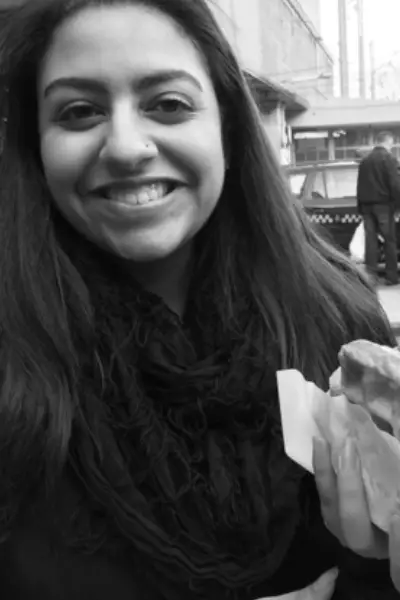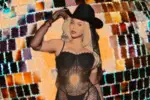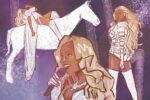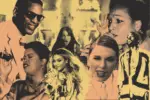When Life Gave Bey Lemons, She Made Lemonade
If you don’t think Béyonce is an artist after listening to her newest album, you’re wrong.
By Sofia Rivera, Simmons College
True art, so I’ve been told, is made to be polarizing.
It’s meant to make you feel strongly, to change you without your consent. It’s supposed to come over you like a wave, or like the rainbow-colored parachute in that elementary school game no one likes.
Picasso didn’t care if you ‘liked’ his paintings, he wanted you to love them or hate them. Garcia Lorca sought for each spectator to leave the theater having experienced some catharsis—having become a better person in some way. Michelangelo didn’t hope you’d look up at the ceiling of the Sistine Chapel and just as easily look down. And Béyonce, when she surprise-dropped her second visual album the week before last, didn’t want any of us to study for our finals.
It’s Friday, I have a fifteen page Spanish essay due in three days that I have yet to start, and rather than a word document I’m staring at Tidal, waiting for Béyonce’s vocals to filter up through my earbuds.
I’m haunted from the first note. The hour-long visual experience opens with Béyonce in profile, head down, hair in cornrows and adorned in a fur coat. Yet the glamor she usually exudes is stripped down, and the next time she appears on screen it’s in the middle of a breezy meadow wearing a black zip-down with the hood pulled up over her head. As she begins to harmonize with herself I feel inexplicably anxious—but in a good way, like the seconds before a first kiss, or the clicks as a roller coaster inches up the incline, something in between giddy and terrified.
When the hour finishes, I’m on the verge of tears, maybe because I’ve forgotten to blink—or been unwilling to look away from the screen for that long. My jaw hangs open slightly, and I feel undeniably different.
The first track, “Pray You Catch Me,” begins with the lyrics, “I can taste the dishonesty, it’s all over your breath as you pass it off so cavalier…My lonely ear pressed against the walls of your world / Prayin’ to catch you whisperin’, prayin’ you’ll catch me listenin.’” The hurt beneath the lyrics passes over her hood-framed face, proving for the millionth time that she is talented in every facet, acting included—or perhaps indicating that the pain beneath the words comes from a very real place.
In fact, the themes of hurt and betrayal are rampant throughout the album. In “Hold Up” she sings, “Can’t you see there’s no other man above you? / What a wicked way to treat the girl that loves you. / Something don’t feel right because it ain’t right, especially coming up after midnight / I smell your secrets and I’m not too perfect to ever feel this worthless / How did it come down to this, going through your call list? / I don’t wanna lose my pride but I’ma f*ck me up a bitch.” Throughout the video she absolutely stuns in a canary yellow floor-length, flowing gown and struts along the sidewalk, carrying a bat that reads “Hot sauce” and smashing almost anything she comes across (mainly car windows), all while flashing her megawatt smile. The dissonance of the image with the verse only adds to the badassery.
In “Love Draught” she says, “Ten times out of nine I know you’re lyin’, but nine times out of ten I know you’re tryin’,” and in “Sorry” she now famously concludes with the line, “He only want me when I’m not there / He better call Becky with the good hair.” All signs point to cheating, as the ‘Bey hive’ clearly concluded—thousands of Yonce fans determined that fashion designer Rachel Roy and then singer Rita Ora were “Becky with the good hair.”
But as both Jay Z and Blue Ivy appear in later parts of the album, it seems that the family is as together as ever, and Béyonce has made no statements to indicate otherwise. Actually the beauty of Béyonce is that she hardly ever reveals details about her personal life. Sia’s foil, she gives us her image but not her words. In May of last year a spokesperson for Béyonce said that she had not given a direct interview in over a year, and it may have been even longer. When she appeared on the front page of “Vogue’s” September issue this year, a coveted cover for any star, she disregarded the norm and declined to provide an interview.
The beauty of her elusiveness is that us plebeians are at the mercy of her music—we analyze and assume, listen and re-listen, trying to search for some nugget of Béyonce. In our constant quest to break down the barriers of celebrities’ personal lives, Béyonce has brushed off our greedy questions and instead presented us with her own art—“Lemonade” being her most stunning work so far—and in doing so has forced us to soak up and interpret art the way you’re supposed to.
And while it is impossible for us to know how much of “Lemonade” comes from the lemons of Béyonce’s own life, the chapters of the story it tells overtly borrow from others. The spoken-not-sung excerpts of beautiful and unsettling poetry that link each track are borrowed from the Somali-Britsh poet Warsan Shire. The excerpt of speech in “Don’t Hurt Yourself” comes from Malcolm X, and several important figures feature in the visual aspect of the album, from Serena Williams and Amanda Stenberg to Sybrina Fulton, the mother of Trayvon Martin, and Lesley McSpadden, the mother of Michael Brown. Not to mention vocal collaborators such as Kendrick Lamar, Jack White and The Weeknd.
With this album Béyonce embraces the intersectionality of her identity yet again; even though we are not always privy to all parts of her, she has never ceased to be all of those parts. Black and woman and wife and Texas native, in love and insecure, proud and vulnerable. At one point during the video, the screen is briefly overtaken by bold white letters against a black background: “God is God I am not.”
Try as we might to make her into a deity, through “Lemonade” she relentlessly reminds us that she’s a mere mortal (almost) like the rest of us.
The album tells a story—be it Béyonce’s own, her mother’s, that of the woman in love and betrayed, of the black woman in America, or all of the above—and expertly so. Each chapter of music and voiceover has it’s own title: Intuition, Denial, Anger, Apathy, Emptiness, Accountability, Reformation, Forgiveness, Resurrection, Hope, and finally Redemption. As the labels indicate an emotional journey, so does the music. From the steel-drummed beach vibe of “Hold On” to the powerfully sweet riffs of “Sandcastles,” Béyonce demonstrates not only her vocal and stylistic range, but, ambitiously and successfully, the spectrum of human emotion.
Yesterday, I experienced what I’m coining as the Béyonce Blackout. After having stayed up most of the night finishing that 15-pager and returning home from taking a final exam, I woke up without any recollection of having fallen asleep. I was lying across my bed the short way, only halfway on the mattress with my clothes and shoes still on and earbuds in, Béyonce’s “Lemonade” still playing. I wiped at some drool on the corner of my mouth, looked at my phone and realized I’d slept through my study time for my next final.
If you too want to ‘wake up like this’—dazed, confused, and screwed for your finals—go listen to “Lemonade” already. Sit down for an hour in bed or the back corner of the library as you pretend to study. Settle into some earbuds (or ideally some noise-canceling headphones) and put the video in full-screen. Like all real art, you’ll come away from it a different person.


















[…] Beyoncé touches is released on the site first, and in some cases, exclusively. Her sixth album, “Lemonade,” an emotionally charged chronicle of her husband’s infidelities, has yet to be made available […]
[…] And just when you think nothing can top her previous visual albums, “Beyonce” and “Lemonade,” she finds a way. With the debut of her newest visual album, “Black Is King,” Beyonce has […]